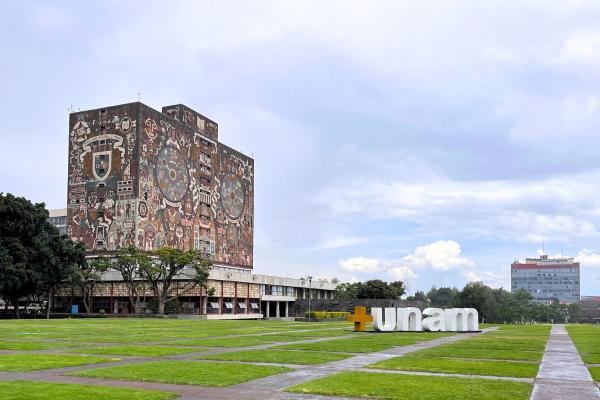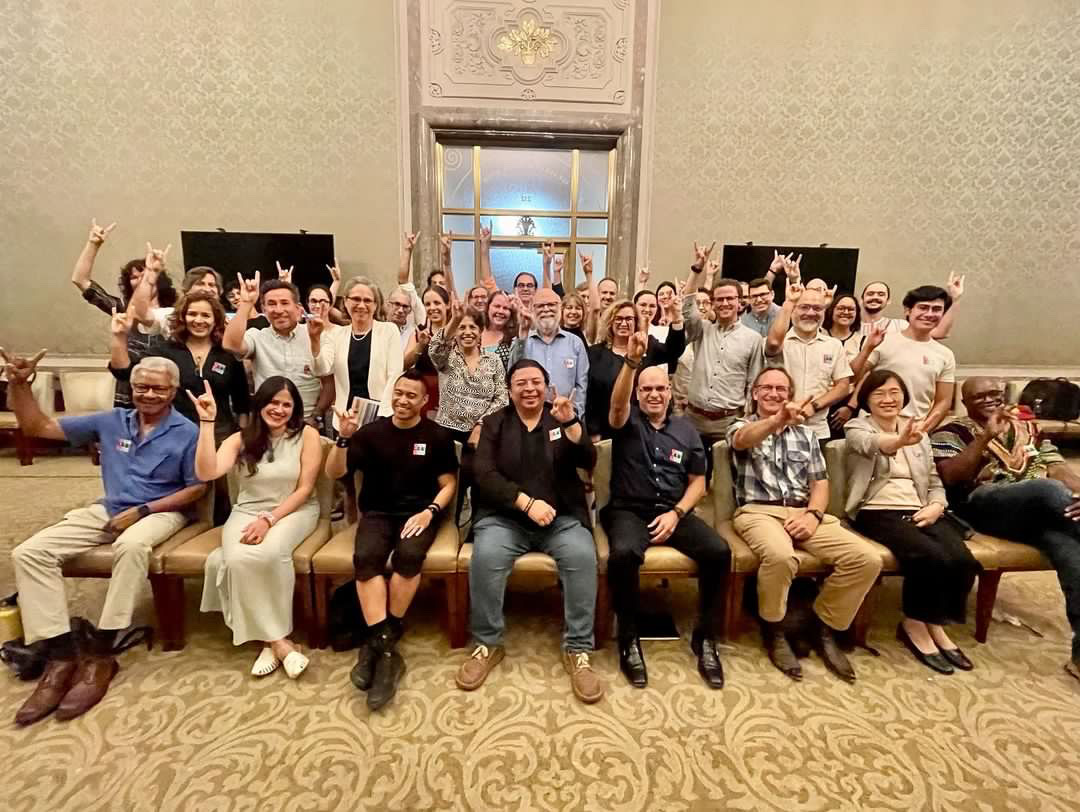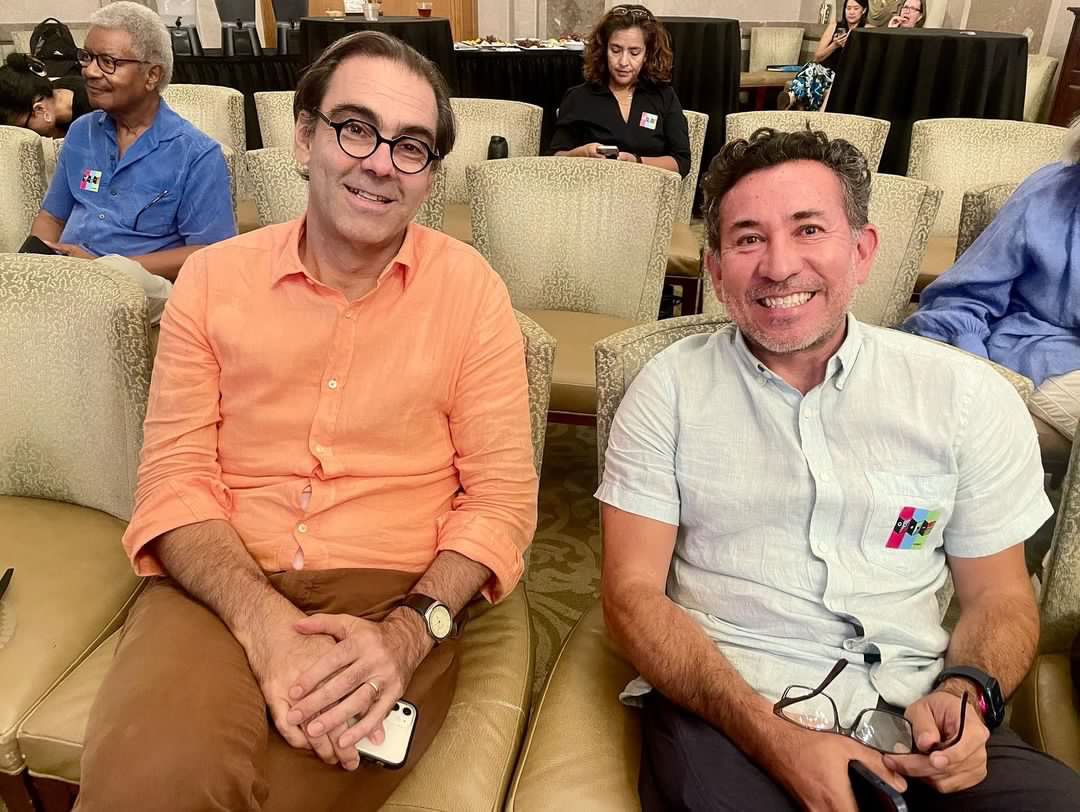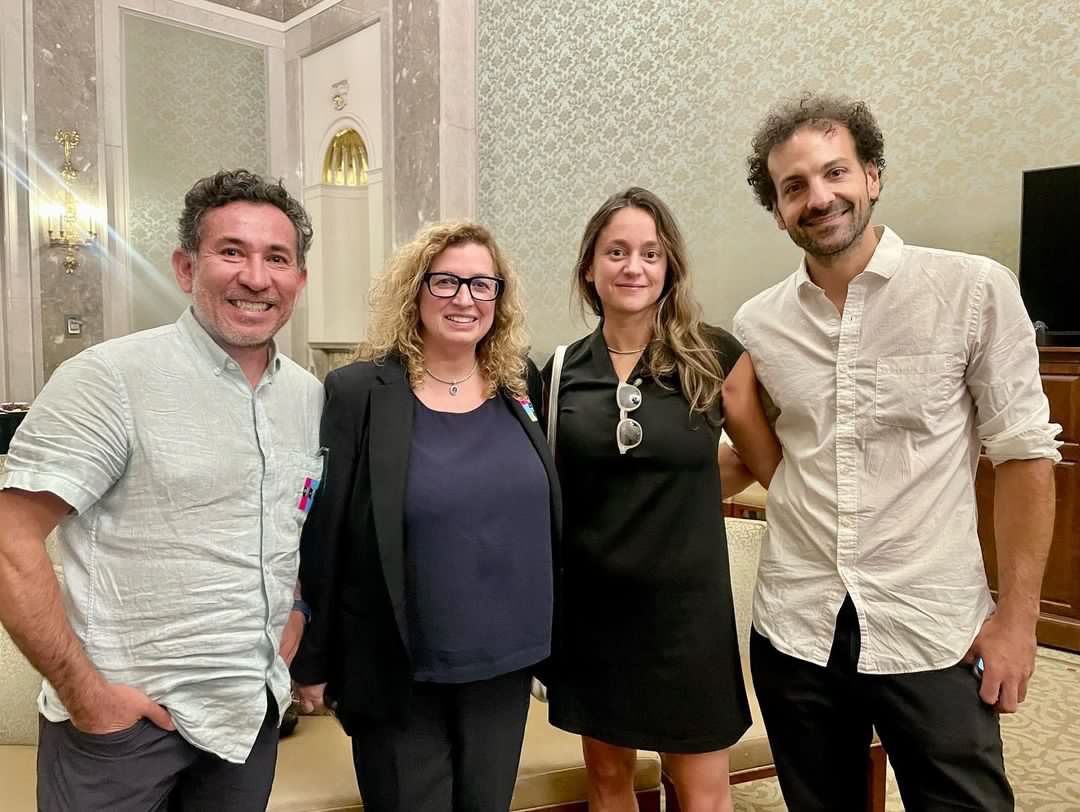Exploring the Architecture of the Americas at FILUNI 2023

This month, several School of Architecture faculty members will travel to Mexico City for the Universidad Nacional Autónoma de México (UNAM)’s La Feria Internacional del Libro de las Universitarias y los Universitarios 2023, FILUNI (the acronym in Spanish). Held annually, the multinational book fair and conference attracts tens of thousands of participants from around the world—and this year, The University of Texas at Austin is the first U.S. university to participate in FILUNI as the guest of honor.
Starting August 29 and continuing through September 3, 130 representatives from UT Austin will present more than 50 roundtable discussions, research symposia, performances, film screenings, and exhibits throughout the event, held on UNAM’s campus in Mexico City. Six faculty members will represent the School of Architecture—Kory Bieg, Ria Bravo, Benjamin Ibarra-Sevilla, Juan Miró, Clay Odom, and Juana Salcedo—giving presentations and participating in panel discussions on topics that range from the relationship between artificial intelligence and architecture to the role that the indigenous population played in the construction of Mexican colonial architecture, and beyond.
With more faculty focused on Latin America than any other architecture school in the country, the UT School of Architecture is widely recognized for its expertise in the region. In addition to faculty scholarship and expertise, a series of events and publications over the past couple of decades have connected the school to universities throughout the Americas and laid the foundations for long-lasting academic and professional networks that established the school as an international hub for scholarly conversations related to the urban, cultural, and natural landscapes of “The Americas.”
For students, the school has expansive opportunities to study and research in Latin America, including two certificates in Latin American Architecture, a dual degree in Planning and Latin American Studies, and several advanced studios focused on the region. In the past several years, numerous studios, including Professor Miró’s and Associate Professor Ibarra-Sevilla’s advanced studios in Mexico (Studio Mexico), have even partnered directly with architecture students at UNAM.
“The selection of The University of Texas at Austin as the guest of honor at FILUNI is a profound recognition of our commitment to academic excellence, collaboration, and our shared values of education, outreach, and human connection,” said Ibarra-Sevilla, UTSOA’s faculty lead for FILUNI and an alumnus of UNAM. “This recognition opens doors for new opportunities and collaborations across Latin America, and places us at the heart of an exciting network of scholars, authors, and thinkers, paving the way for future partnerships and successes.”
For more information about UT Austin’s involvement at FILUNI, read the announcement press release and see SOA faculty panel descriptions below. The full FILUNI program is also available online.
“Mapping the Jaguar Corridor: A Radiography of Urbanization” | Assistant Professor of Practice Juana Salcedo
Wednesday, August 30, 2023: 12:00 p.m.
This session is an invitation to discuss the connection between urban life and the conservation of the jaguar. The Jaguar Corridor Initiative is an unprecedented hemispheric integration project that envisages a series of continuous landscapes connecting the Americas’ largest feline. Throughout the workshop, participants will explore how, far from an exclusive matter of conservation biology, the Jaguar Corridor is a socio-cultural project strongly related to urban life. The workshop will navigate and discuss a series of visual narratives and interactive cartographies that correlate urbanization processes and environmental struggles with the Jaguar Corridor. Focusing on the Mexican territory, we’ll explore the urban origins of the environmental breakdown and biodiversity loss and the possibility (and urgency) of reimagining new landscapes of multispecies coexistence.
“Miró Rivera Architects: Building a New Arcadia” | Professor Juan Miró in conversation with Dr. Juan Ignacio del Cueto, Dr. Fernanda Canales, and Mario Schjetnan
Friday, September 1, 2023: 11:00 a.m.
Building a New Arcadia is the first monograph on the work of Miró Rivera Architects, an internationally recognized studio based in Austin, Texas, with projects in the U.S. and Mexico. The book, published by UT Press, includes original articles, drawings, and photographs. A panel of experts including Miró Rivera Architects founder and School of Architecture Professor Juan Miró, Dr. Juan Ignacio del Cueto, director of the Faculty of Architecture of the UNAM, and two prestigious Mexican architects, Fernanda Canales and Mario Schjetnan, will comment on the work and the ideas presented in the book.
“Mexican Architecture and its History from a Multidisciplinary Perspective” | Associate Professor Benjamin Ibarra-Sevilla in conversation with David Stuart and Dr. Sergio M. Alcocer
Friday, September 1, 2023: 4:00 p.m.
Bringing together a multidisciplinary team of experts, this panel discussion will provide a comprehensive and multifaceted exploration of the history and values of Mexican architecture—examining its significance from different angles and highlighting the diverse contributions of architects, archaeologists, and engineers to this rich and fascinating field. The panel will seek to identify the elements that make Mexican architecture a cultural treasure and a tourist attraction, examining its most representative features and analyzing the way in which different techniques and technologies have been integrated over time. It will also discuss how Mexican architecture has adapted to environmental and climatic conditions, highlighting its ability to combine aesthetics and functionality. Ultimately, the panel’s goal is to highlight the richness and diversity of Mexican architecture and promote the importance of protecting and preserving its architectural heritage for future generations.
Artificial Architecture | Assistant Professor Ria Bravo, Associate Professor Kory Bieg, and Associate Professor Clay Odom, in conversation with Ronan Bolaños Linares, Vanessa Sattele Gunther, and Frank Jacobus
Saturday, September 2, 2023: 1:00 p.m.
The panel discussion will take a deep dive into the relationship between artificial intelligence and architecture, exploring the potential benefits of using AI algorithms in the design process and the ethical and philosophical implications of relying on them. Potential questions include:
- What are some key benefits of using AI algorithms in the design process, and how do they differ from traditional design methods?
- How can we ensure that AI algorithms are transparent and accountable in the design process, and what role do architects play?
- How do we balance the benefits of using AI in the design process with the need to preserve human creativity and intuition in architecture?
- What are some of the most significant ethical and philosophical implications of using AI in architecture, and how can we address these concerns?
- How do AI algorithms impact issues such as sustainability, accessibility, and social justice in architecture, and what are some potential pitfalls to be aware of?
- What role do education and training play in preparing architects to work with AI algorithms, and what changes may need to be made to architectural education programs to reflect this new reality?
What is the future of architecture in a world where AI algorithms play an increasingly significant role in the design process, and how can architects stay ahead of the curve?
The Art of Mixtec Stonework: Contributions of the Indigenous Population to Colonial Architecture. Breaking the Myth of the Hispanic Builder | Associate Professor Benjamin Ibarra-Sevilla in conversation with Enrique Lastra, Mariano Del Cueto, Yúmari Pérez Ramos, Fernando López Cortés, and Fabián Bernal Orozco
Saturday, September 2, 2023: 2:00 p.m.
The panel discussion "Contributions of the indigenous population to colonial architecture; Breaking the myth of the Spaniard Builder" highlights the crucial role of indigenous labor and experience in constructing iconic structures in Mexico during the colonial era. The panel seeks to challenge the myth of the Hispanic builder and acknowledge the significant impact of indigenous populations on colonial architecture, exploring how indigenous techniques and materials were incorporated into European aesthetics. By breaking this myth, the panelists hope to inspire a greater appreciation for the cultural and historical forces that shaped colonial architecture in the region.
Round Table: “Felix Candela Museum: A New Life for the Old Stock Market” | Professor Juan Miro in conversation with Dr. Juan Ignacio del Cueto, Elisa Drago, and Dolores Martínez Orralde
Saturday, September 2, 2023: 4:00 p.m.
In this roundtable discussion, experts will discuss plans for the Félix Candela Museum, dedicated to the great Spanish-Mexican architect and located in the Old Stock Exchange of Mexico in the Historic Center of CDMX. The idea was developed during a joint design workshop led by the UNAM School of Architecture and the University of Texas at Austin School of Architecture in 2014. The projects and research carried out by the students were published in a book, which will also be discussed during the round table. Participants include Dr. Juan Ignacio del Cueto, director of the Faculty of Architecture of the UNAM, Elisa Drago, Head of the Mexican Architecture Collection, Dolores Martínez Orralde, Director of Real Estate of the INBA and Juan Miró, Professor from the School of Architecture at the University of Texas at Austin.




